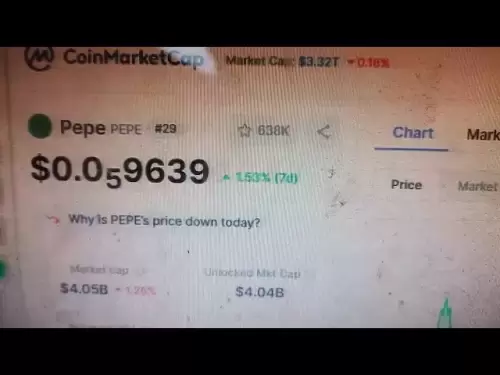 |
|
 |
|
 |
|
 |
|
 |
|
 |
|
 |
|
 |
|
 |
|
 |
|
 |
|
 |
|
 |
|
 |
|
 |
|
Cryptocurrency News Articles
Debt Explosion: Ray Dalio's Painful Disruptions Warning
Jul 06, 2025 at 09:30 am
Ray Dalio warns of 'big, painful disruptions' due to exploding U.S. debt. Is a financial reckoning inevitable? How can we prepare?

Debt Explosion: Ray Dalio's Painful Disruptions Warning
Ray Dalio is sounding the alarm. Exploding U.S. debt, shrinking revenues, and spiraling interest costs are a recipe for disaster, potentially leading to brutal market shocks and systemic instability. Are we headed for a financial reckoning? Let's dive in.
Dalio's Dire Prediction
Bridgewater Associates founder Ray Dalio has been vocal about the unsustainable trajectory of U.S. debt. He points out that annual government spending is projected to reach $7 trillion while revenues lag at $5 trillion. This massive deficit is set to push the national debt from 100% to a staggering 130% of GDP within the next decade.
The implications are enormous. The debt burden per American family could soar from $230,000 to $425,000. Servicing this debt will become increasingly expensive, potentially reaching $18 trillion annually. Dalio warns this fiscal pressure could trigger severe cuts to government programs, steep tax hikes, or significant monetary expansion – each with painful consequences.
The Inevitable Disruptions
Dalio emphasizes that unless the budget deficit is drastically reduced from roughly 7% of GDP to about 3%, "big, painful disruptions will likely occur." These disruptions could manifest as a bond-market slide, a severe economic downturn, or a combination of both.
The U.S. national debt has already reached $37 trillion, raising the specter of an oversupply of Treasury bonds meeting weakening demand. This scenario could lead to higher inflation and a drop in the value of Treasury bonds, further complicating the economic landscape.
What's the Solution?
Dalio suggests that policymakers often resort to lowering interest rates and devaluing currency to cope with unsustainable debt levels. While this approach might obscure the erosion of wealth and purchasing power, it remains a favored tactic due to its subtlety.
However, true solutions require difficult choices: slashing spending, raising taxes dramatically, or printing more money. Each option carries serious consequences that could further destabilize the economy. Dalio references fiscal reforms of the 1990s, urging deficit reduction to stabilize financial markets. The lesson here is clear, proactive measures today can avoid disaster tomorrow.
A Silver Lining?
Amid these rising debt concerns, assets like gold and Bitcoin are being spotlighted as potential safe havens. Dalio suggests that they could perform well during fiscal instability as markets seek refuge from economic turmoil. Some analysts even view Dalio's debt warning as a bullish signal for these alternative assets, despite concerns about their current valuations. But these assets are not without risk and should be considered speculative investments.
Looking Ahead
Dalio's warnings serve as a stark reminder of the need for prudent fiscal policies to ensure long-term economic stability. The path forward requires decisive action and a willingness to make difficult choices. The future of the U.S. economy may depend on it.
So, what's an investor to do? Keep calm and carry on! While Dalio's predictions are sobering, remember that market fluctuations are a part of life. Diversify your portfolio, stay informed, and maybe keep a little gold under your mattress – just in case!
Disclaimer:info@kdj.com
The information provided is not trading advice. kdj.com does not assume any responsibility for any investments made based on the information provided in this article. Cryptocurrencies are highly volatile and it is highly recommended that you invest with caution after thorough research!
If you believe that the content used on this website infringes your copyright, please contact us immediately (info@kdj.com) and we will delete it promptly.






























































